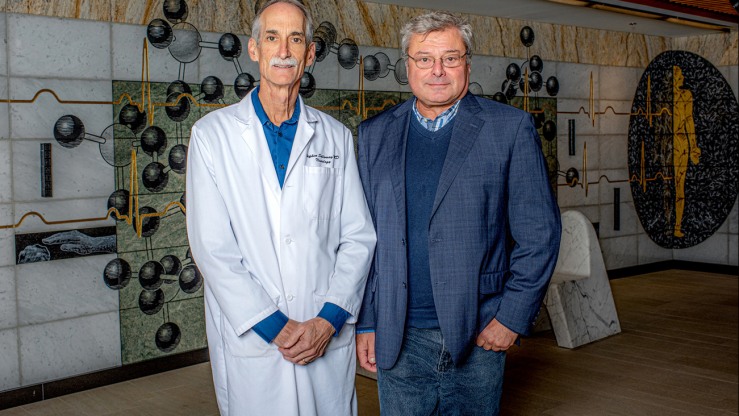A major grant from the Alzheimer's Association will enable researchers to test a drug that could reduce brain inflammation in Alzheimer's patients and possibly slow the progression of the disease.
PROVIDENCE, R.I. - With a new grant from the Alzheimer's Association, a team of researchers from Brown University, Butler Hospital and the Miriam Hospital will conduct a phase-one clinical trial of a drug that could potentially provide a new avenue for the treatment of Alzheimer's disease.
The drug, called emtricitabine (Emtriva), is from a class of therapeutics typically used to treat HIV and AIDS. Research by John Sedivy, a professor of molecular biology, cell biology and biochemistry at Brown and director of the Brown Center on the Biology of Aging, has shown that the drug can potentially reduce a type of age-related cellular inflammation that has been associated with Alzheimer's. This new clinical trial is an initial step toward determining if the drug may benefit people with the disease.
"There's been a tremendous push to start thinking about Alzheimer's and other age-associated diseases in new ways," said Sedivy, who is also affiliated with the Brown Institute for Translational Science (BITS). "That is exactly what we're doing with this study by using a class of drugs that has never been used before in this context. We know that the Alzheimer's brain is an inflamed brain, and we're hopeful that by down-regulating that inflammation we can modify the course of the disease."
The trial is supported by a $750,000 grant from the Alzheimer's Association's Part the Cloud Translational Research Funding program, which aims to increase funding for early-stage clinical trials of promising new drug treatments. Sedivy and Dr. Stephen Salloway, a professor of neurology and psychiatry at the Warren Alpert Medical School and director of Butler Hospital's Memory and Aging Program, will lead the research. They will work closely with Dr. Rami Kantor, a professor of medicine and director of the HIV Resistance Laboratory at the Miriam Hospital, as well as Constantine Gatsonis and Fenghai Duan from the Center for Statistical Sciences at Brown's School of Public Health.
"This is such an exciting trial because this is an entirely new target for treating Alzheimer's," said Salloway, who is also affiliated with Brown's Carney Institute for Brain Science. "This is the kind of discovery science that will be necessary for us to find more effective treatments for this disease. We're very grateful that the Alzheimer's Association and Part the Cloud have made this work possible."
For the phase-one trial, the researchers plan to recruit 35 patients, 25 of whom will get the drug and 10 of whom will get a placebo. The primary goal is to test the safety and tolerability of the drug in Alzheimer's patients.
"The first priority here is safety," Sedivy said. "These drugs are prescribed to millions of people around the world with HIV and are very well tolerated. But HIV patients tend to be on the younger side, so we need to make sure the drug is well tolerated in older people, and people with Alzheimer's in particular."
At the same time, the researchers will evaluate the effect of the drug on markers of inflammation, along with assessments of patients' behavior and cognition.
"In a phase-one trial, it's unlikely that we'll be able to say definitively whether this drug might be effective in treating Alzheimer's," Sedivy said. "But we're optimistic that we can move the needle on some of these disease markers, which would pave the way for additional trials to more fully evaluate the drug's efficacy."
Prior research by Sedivy, who focuses on the biology of aging, suggests that there is reason for optimism. In a study published earlier this year in the journal Nature, Sedivy and colleagues showed that this drug was effective in reducing age-related inflammation in mice.
"This study exemplifies the work we are doing in the Brown Institute for Translational Science and in Biology and Medicine at Brown University," said Jack A. Elias, senior vice president for health affairs and dean of medicine and biological sciences at Brown. "We have an integrated team of basic and pathogenesis-focused scientists and master clinicians collaborating with experts from the School of Public Health. Working together, they are testing the application of Dr. Sedivy's discovery in a real-world setting. If this study is successful it will have an amazing impact at Brown and the world and will change our understanding of the mechanisms that underlie this devastating disease. This is exactly the type of research we do and want to do more of through BITS."
Salloway said that the trial is a testament to the ability of Brown and its affiliated hospitals to bring breakthroughs in basic biology into the clinical setting.
"The reason we were able to move forward on this so quickly is that we have such a collaborative atmosphere here," Salloway said. "These collaborations make it possible to bring world-class work in basic biology - like the work that Professor Sedivy is doing - together with our robust clinical research program. I think we have a great model for how this kind of translational science can be done."
The researchers intend to begin enrolling patients early in 2020. Additional details for potential participants are available via Butler Hospital's Alzheimer's Prevention Registry (www.butler.org/alzregistry / 401-455-6402).
"We're excited about the potential of all of this groundbreaking Alzheimer's research made available through Part the Cloud - and especially proud of what is going to be undertaken right here in Rhode Island," said Donna M. McGowan, Executive Director of the Alzheimer's Association, Rhode Island Chapter. "With more than five million Americans and tens of millions more worldwide living with Alzheimer's disease, there is an urgent need to identify therapies that can prevent, stop or reverse brain cell damage caused by Alzheimer's disease and other dementias. To identify these therapies, we must explore innovative avenues of research, such as with this HIV/AIDS inhibitor drug, that can accelerate needed treatments and one day, a cure for this disease."







